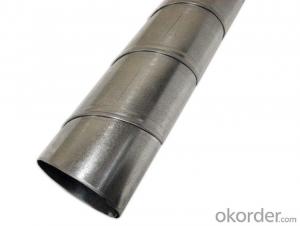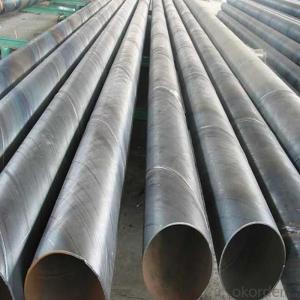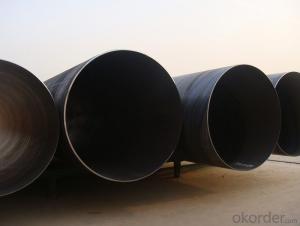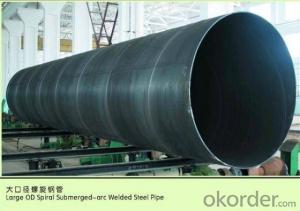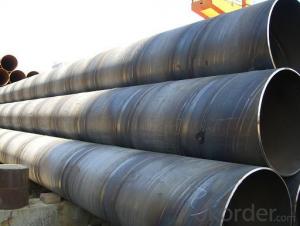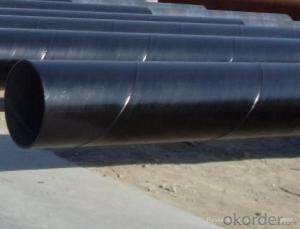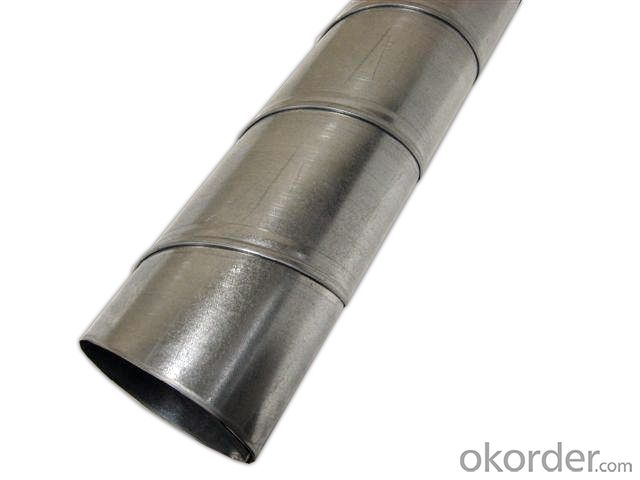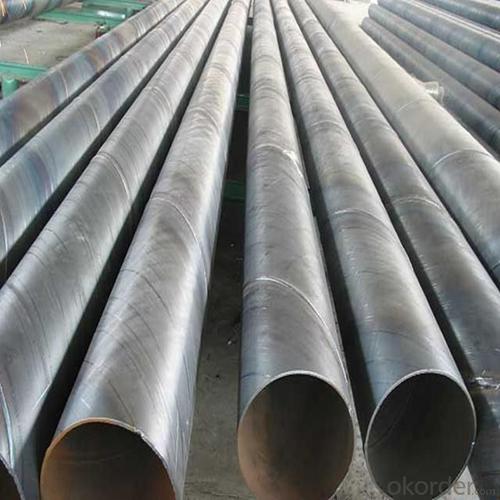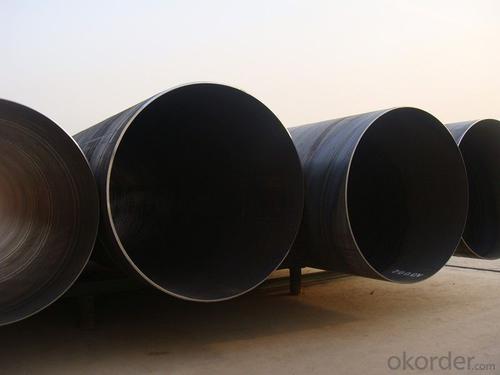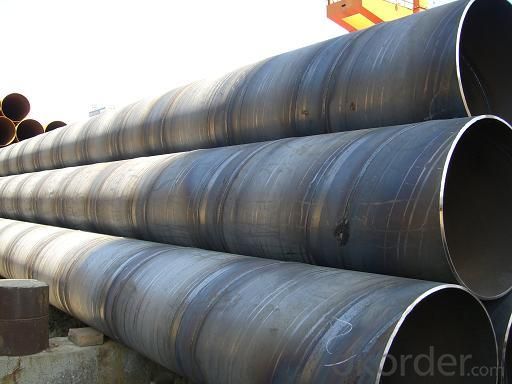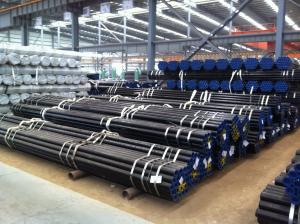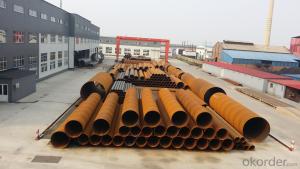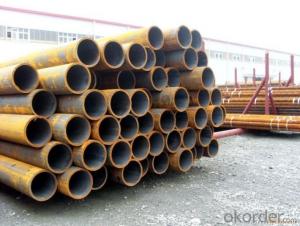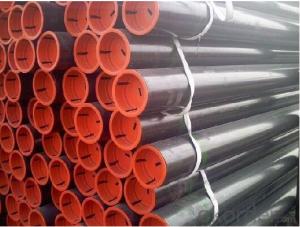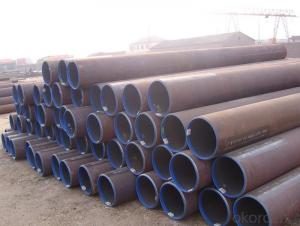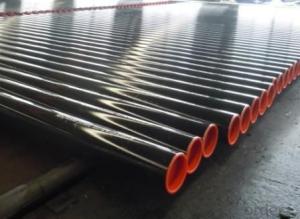SPIRAL CARBON STEEL PIPE API 5L
- Loading Port:
- China Main Port
- Payment Terms:
- TT OR LC
- Min Order Qty:
- -
- Supply Capability:
- -
OKorder Service Pledge
OKorder Financial Service
You Might Also Like
Packaging & Delivery
Packaging Detail: | standard export packing or as customer's requirement |
Delivery Detail: | within 10 - 30 days |
Specifications
Spiral Welded Steel Pipes and Tubes
1.Material:Q195-Q235
2.Length:1-12m
3.WT:1.0-14mm
4.O.D.:20-273mm
Spiral Welded Steel Pipes and Tubes
Product Description:
1.Material : Q235,Q345,L245,L290,L360,L415,L450,L485,GrB,X42,46,X52,X56,X60,X65,X70,X80,X100
2,Standard: SY/T5037-2000,GB/T9711-2011,API Spec 5L PSL1/PSL2,ASTM A252\A53,ISO3183,DIN17172,EN10217,JIS G3457,AWWA C200,ASTM A139,ASTM A671,ASTM A672
3.Wall thickness: 3.0mm-30mm
4.Outer diameter: φ168mm-3020mm
5,Length: 5m-12m or as your requirement
6,Corrosion protection standard: DIN30670,DIN30671, AWWAC210, AWWA C203, SY/T0413-2002,SY/T0414-2002
7,Application: Oil, gas, natural gas, water pipe, thermal electricity pipe, steel structure engineering, etc
Q195-q345 Material Steel Pipe's Materials
Elements | Chemical Compsition% | Mechanical Property | ||||||
| C% | Mn% | S% | P% | Si% | Yield Point (Mpa) | Tensile Strength(Mpa) | Elongation |
Q195 | 0.06-0.12 | 0.25-0.50 | <0.050 | <0.045 | <0.030 | >195 | 315-430 | 32-33 |
Q215 | 0.09-0.15 | 0.25-0.55 | <0.05 | <0.045 | <0.030 | >215 | 335-450 | 26-31 |
Q235 | 0.12-0.20 | 0.30-0.70 | <0.045 | <0.045 | <0.030 | >235 | 375-500 | 24-26 |
Q345 | <0.20 | 1.0-1.6 | <0.040 | <0.040 | <0.55 | >345 | 470-630 | 21-22 |
- Q: What is the average lifespan of steel pipes in different applications?
- The average lifespan of steel pipes in different applications can vary significantly depending on factors such as the type of application, the environment it is exposed to, and the level of maintenance. However, in general, steel pipes can last anywhere from 20 to 100 years or more, making them a durable and reliable choice for various industries and infrastructure projects.
- Q: What are the different shapes available for steel pipes?
- There are several different shapes available for steel pipes, including round, square, rectangular, and oval shapes.
- Q: What are the alternatives to steel pipes for various applications?
- Some alternatives to steel pipes for various applications include PVC (polyvinyl chloride) pipes, copper pipes, aluminum pipes, and fiberglass pipes. Each alternative has its own advantages and disadvantages, such as cost, durability, and resistance to corrosion, which make them suitable for specific applications.
- Q: What is the electrical conductivity of steel pipes?
- Due to its metallic nature, steel pipes possess a notable degree of electrical conductivity. The specific composition and properties of the steel employed can influence the electrical conductivity of these pipes. Typically, steel exhibits a conductivity range of 6.99 × 10^6 to 9.64 × 10^6 siemens per meter (S/m) at room temperature. Consequently, steel pipes are capable of effectively conducting electricity and finding application in diverse fields, including electrical transmission and grounding systems.
- Q: What is the composition of steel pipes?
- Steel pipes are primarily composed of iron and carbon, with small amounts of other elements such as manganese, silicon, and sulfur.
- Q: What is the difference between steel pipes and concrete pipes?
- Steel pipes and concrete pipes differ in terms of their material composition and physical characteristics. Steel pipes are made from steel alloys, which make them strong, durable, and resistant to corrosion. They have high tensile strength, allowing them to withstand high-pressure applications. Steel pipes are commonly used in industries such as oil and gas, plumbing, and construction. On the other hand, concrete pipes are made from a mixture of cement, aggregates, and water. They are known for their exceptional compressive strength and durability. Concrete pipes are commonly used in sewage systems, drainage systems, and culverts. In terms of installation, steel pipes are lightweight and easy to handle, making them more convenient to transport and install. Concrete pipes, on the other hand, are heavier and require specialized equipment for installation. Additionally, steel pipes have a smooth internal surface, which allows for efficient flow of fluids or gases. Concrete pipes, however, have a rougher internal surface, which may cause more friction and result in reduced flow rates. Overall, the choice between steel pipes and concrete pipes depends on the specific requirements of the project, including factors such as application, budget, and durability needs.
- Q: Can steel pipes be used for underground chemical pipelines?
- Indeed, underground chemical pipelines can utilize steel pipes. The chemical industry, among other industries, extensively employs steel pipes owing to their robustness, potency, and resistance to corrosion. To ensure suitability for underground chemical pipelines, it is crucial to select an appropriate steel grade that can withstand corrosion from the specific chemicals being transported. Furthermore, the resistance of steel pipes to chemical corrosion can be further augmented through the implementation of suitable coating and lining techniques. Regular inspection and maintenance are imperative to guarantee the integrity and safety of the underground chemical pipeline system.
- Q: How are steel pipes protected against corrosion in marine environments?
- Steel pipes are protected against corrosion in marine environments through various methods such as applying protective coatings, using cathodic protection systems, and employing sacrificial anodes. These measures create a barrier between the pipe surface and the corrosive elements in the marine environment, thereby increasing the lifespan and integrity of the pipes.
- Q: How are steel pipes used in sewage systems?
- Steel pipes are commonly used in sewage systems due to their durability and strength. They are used to transport sewage from homes, businesses, and industries to treatment plants or disposal sites. Steel pipes are able to handle the corrosive nature of sewage and are resistant to various chemicals and pressure. Additionally, they are also used for the construction of manholes, pumping stations, and other sewage system infrastructure.
- Q: What is the difference between steel pipes and polyethylene pipes?
- Steel pipes and polyethylene pipes are two types of piping materials that have different characteristics and uses. Steel pipes are made of a durable and strong material, making them suitable for high-pressure applications and transporting fluids or gases. They have a high resistance to heat, corrosion, and impacts, making them ideal for industrial and heavy-duty applications. Steel pipes are commonly used in industries such as oil and gas, construction, and infrastructure projects. Polyethylene pipes, on the other hand, are made of a flexible and lightweight plastic material known as polyethylene. They are commonly used for underground water supply systems, irrigation, and drainage systems. Polyethylene pipes have excellent resistance to chemicals, making them suitable for transporting water and other fluids. They are also more affordable and easier to install compared to steel pipes. In summary, the main difference between steel pipes and polyethylene pipes lies in their material composition, strength, and applications. Steel pipes are stronger and suitable for high-pressure applications, while polyethylene pipes are flexible, lightweight, and commonly used for water supply and drainage systems.
Send your message to us
SPIRAL CARBON STEEL PIPE API 5L
- Loading Port:
- China Main Port
- Payment Terms:
- TT OR LC
- Min Order Qty:
- -
- Supply Capability:
- -
OKorder Service Pledge
OKorder Financial Service
Similar products
Hot products
Hot Searches
Related keywords
